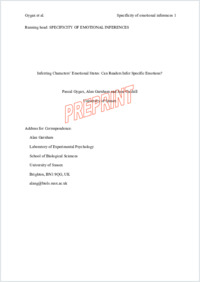Understanding Emotions in Text: Readers Do Not Represent Specific Emotions
- Gygax, Pascal University of Sussex
- Garnham, Alan University of Sussex
- Oakhill, Jane University of Sussex
-
2004
English
Gygax, Oakhill and Garnham (2003) showed that, contrary to the assumption of earlier research (e.g. Gernsbacher, Goldsmith, & Robertson, 1992), readers do not infer specific emotions such as guilt or boredom. This paper presents evidence for the non-specificity of emotional inferences regardless of the nature of the stories. In Experiment 1 and 2, Gygax et al.’s stories were made longer. In Experiment 1 (off-line), people rated specific emotions as more likely, but in Experiment 2 (on-line), there was no difference between target sentences containing different matching emotions, although participants took longer to read sentences containing emotions mismatching the stories. In Experiment 3 and 4, the stories included a coherence break resolvable by inferring the main character's emotional state. In Experiment 3 (off-line), people rated specific emotions as more likely, but in Experiment 4 (on-line), there was, again, no difference between target sentences containing different matching emotions.
- Faculty
- Faculté des lettres et des sciences humaines
- Department
- Département de Psychologie
- Language
-
- English
- Classification
- Psychology
- License
-
License undefined
- Identifiers
-
- RERO DOC 209022
- Persistent URL
- https://folia.unifr.ch/unifr/documents/303435
Statistics
Document views: 139
File downloads:
- Texte intégral: 352
